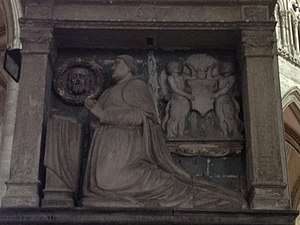Charles de Hémard de Denonville
Charles de Hémard de Denonville (1493–1540) was a French Roman Catholic bishop and cardinal.

Biography
Charles de Hémard de Denonville was born in Denonville in 1493, the son of Pierre Hémard, seigneur de Denonville, and Jeanne Frémiere.[1] He was educated at the Collège de Le Mans in Paris, becoming a doctor of both laws.[2]
After completing his education, he became a secretary of Cardinal Philippe de Luxembourg.[3] In 1515, he obtained the benefice of Notre-Dame de Sanchez, Cahors, and in 1517, the benefice of Dangeau.[4] Also in 1517, he became a canon of the cathedral chapter of Tours Cathedral.[5]
He was ordained as a priest on Easter Sunday, 1518.[6] Following the death of Cardinal Philippe de Luxembourg in 1518, Hémard de Denonville became secretary of Cardinal Adrian Gouffier de Boissy; pastor of Saint-Gabriel de Vignoux, Bourges; and a canon of Coutances Cathedral, later its archdeacon.[7] In 1520, he became a protonotary apostolic; in 1521, prior of Saint-Pierre de Aubiers Abbey in Luçon; in 1522, pastor of Saint-Firmin de Asnières; and in 1523, prior of Saint-Jean des Grèves.[8]
He became a royal chaplain to Francis I of France in January 1526.[9] In 1528, he became a member of the Conseil du Roi.[10] He also became president of the Royal Ecclesiastical Department.[11] He also became a datary attached to the legation to the Kingdom of France, continuing to hold this post even after promotion to the episcopate.[12]
On January 23, 1531, he was elected bishop of Mâcon.[13] In November 1533, he became France's ambassador to the pope in Rome, and he occupied that post from May 1534 to May 1538.[14] In 1535, he became abbot of Saint-Aubin de Angers.[15]
At the request of Francis I of France, Pope Paul III created him a cardinal priest in the consistory of December 22, 1536.[16] He received the red hat the next day and the titular church of San Matteo in Via Merulana on January 15, 1537.[17]
On December 9, 1538, he was named administrator of the see of Amiens.[18]
He traveled to Le Mans with Cardinal Jean du Bellay and there fell ill on August 17, 1540, and died in Le Mans on August 23, 1540.[19] He received heart burial: his heart was buried in Le Mans Cathedral and his body was buried in Amiens Cathedral.[20]
References
- Entry from Biographical Dictionary of Cardinals of the Holy Roman Church
- Entry from Biographical Dictionary of Cardinals of the Holy Roman Church
- Entry from Biographical Dictionary of Cardinals of the Holy Roman Church
- Entry from Biographical Dictionary of Cardinals of the Holy Roman Church
- Entry from Biographical Dictionary of Cardinals of the Holy Roman Church
- Entry from Biographical Dictionary of Cardinals of the Holy Roman Church
- Entry from Biographical Dictionary of Cardinals of the Holy Roman Church
- Entry from Biographical Dictionary of Cardinals of the Holy Roman Church
- Entry from Biographical Dictionary of Cardinals of the Holy Roman Church
- Entry from Biographical Dictionary of Cardinals of the Holy Roman Church
- Entry from Biographical Dictionary of Cardinals of the Holy Roman Church
- Entry from Biographical Dictionary of Cardinals of the Holy Roman Church
- Entry from Biographical Dictionary of Cardinals of the Holy Roman Church
- Entry from Biographical Dictionary of Cardinals of the Holy Roman Church
- Entry from Biographical Dictionary of Cardinals of the Holy Roman Church
- Entry from Biographical Dictionary of Cardinals of the Holy Roman Church
- Entry from Biographical Dictionary of Cardinals of the Holy Roman Church
- Entry from Biographical Dictionary of Cardinals of the Holy Roman Church
- Entry from Biographical Dictionary of Cardinals of the Holy Roman Church
- Entry from Biographical Dictionary of Cardinals of the Holy Roman Church